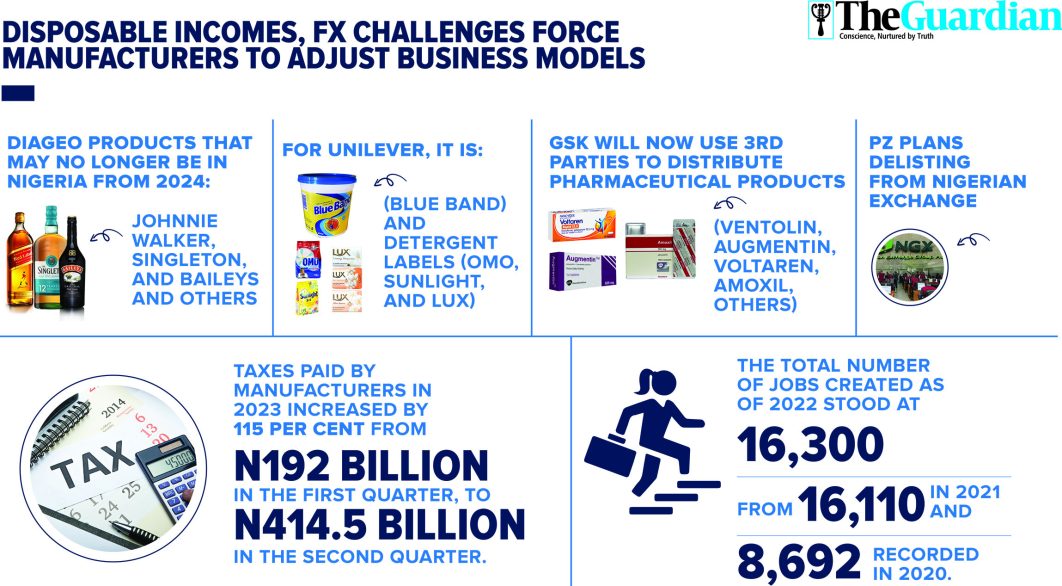
• Forex crises crippling sector as black-market dictates survival
• Scarcity, price hike may promote poor-quality products from unscrupulous operators
• New model, scaling down business segments will trigger fresh job losses
• CPPE, others urge govt to tackle Naira fluctuations, boost ease of doing business
With the economic crisis confronting Nigeria showing no signs of abating anytime soon and the attendant effects becoming more visible daily, many manufacturing firms are beginning to consider major changes in business models, to hedge the lingering foreign exchange challenges and business environment concerns,
The recent changes in business models, occasioned by the persistent foreign exchange crises rocking the country, are likely to compromise the quality of products, which would consequently become a serious threat to human life.
Indeed, while GlaxoSmithKline Consumer Nigeria Plc, popularly known as GSK, has totally pulled out its operations from Nigeria, Guinness Nigeria Plc announced it will no longer import or distribute certain Diageo international premium spirits products, including Johnnie Walker, Singleton, and Baileys and others imported under its 2016 Sale and Distribution Agreement with Diageo plc with effect from April 2024.
Findings also showed that Unilever has cut down significantly on the production of some products including Lux, Sunlight, Lifebuoy, among others. As it is, it is a matter of time for other manufacturing giants to join the trend.
Aside from the forex challenges, many other factors have been adduced for this sudden change. Today, rising inflation and unemployment have eroded the purchasing power of many households, causing a drastic pullback in consumer spending, thereby leaving Nigerians with limited power of choice and subsequently going after cheaper items to cater to their immediate needs. If the situation persists, this could worsen the health status of many Nigerians.
Data from the National Bureau of Statistics (NBC) showed that four million Nigerians were pushed into poverty in H1, 2023 while the 2022 Multidimensional Poverty Index survey revealed that Nigeria has 133 million people or 63 per cent persons, who are multi dimensionally poor.
Indeed, the forex crises, which has put the Naira on a downward trend since the beginning of the year have impacted negatively on companies listed on the exchange, including manufacturing, telecommunications and FMCG resulting in huge half-year losses in their operations. As of last weekend, the dollar sold for N1045/$.
Unfortunately, companies that could no longer cope with the situation are currently exiting the market while others have decided to drop some segments of businesses operating over the years.
The Guardian learnt that the development has triggered fresh job losses in major manufacturing firms thereby aggravating the nation’s unemployment situation, which is already heading towards a very dangerous path.
This is in addition to more than 20 per cent of the Nigerian full-time workforce that lost their jobs during the 2020 COVID-19 pandemic. The rising unemployment situation has sparked a desperation for government jobs, resulting in employment racketeering and other nefarious activities.
Painfully, most of the individuals shut out of employment opportunities are energetic and productive. Should this situation linger, experts have expressed fear that this could spur massive social unrest and insecurity that the nation would find it difficult to contend with soonest, unless appropriate steps are taken to reverse the trend.
Although data from the NBS indicated that unemployment rate in Nigeria declined to 4.10 per cent in the first quarter of 2023 from 5.30 per cent in the fourth quarter of 2022, the rate is projected to trend around 5.40 per cent in 2024 and 4.50 per cent in 2025 in the long-term.
Local manufacturers’ adoption of new business models remains a disincentive to investment.
This development is also expected to impact manufacturers’ tax obligations to governments at different levels. Checks showed that taxes paid by manufacturers in 2023 increased by 115 per cent from N192 billion in the first quarter, to N414.5 billion in the second quarter. This is according to data collated from various Company Income Tax (CIT) and Value Added Tax (VAT) reports published by the National Bureau of Statistics.
In the first quarter of 2023, manufacturers paid N62.9 billion as CIT, while of N129.2 billion was paid as VAT.
In the second quarter, the VAT paid by manufacturers increased by 17 per cent to N151.7 billion, while CIT increased to N262.7 billion. In all, manufacturers paid about N607 billion in taxes in the first half of the year. As it is, tax remittance to the government would be impacted greatly.
Already, MAN revealed that the number of direct jobs created in the sector declined by 20.8 per cent in the second half of 2022 due to the poor operating environment.
In that period, manufacturing employment dipped to 6,741 down in H2 last year from 8,508 and 9559 recorded in the corresponding half of 2021 and H1 2022 respectively.
“The decline in the number of jobs created in the sector during the period corroborates the poor operating business environment that was perverse with high energy cost, exorbitant cost of borrowing, high inflation, low sales due to limited cash and many more,” it stated.
The total number of jobs created as of 2022 stood at 16,300 from 16,110 in 2021 and 8,692 recorded in 2020. “Based on the survey cumulative manufacturing employment since 2013, was estimated at 1.7 million at the end of 2022.”
According to analysts, the job creation figure would dip by the end of 2023 if the crises rocking the economy are not controlled significantly.
Another angle to these crises is that medical practitioners across various hospitals are lamenting scarcity of essential and non-essential/prescription drugs due to supply chain shortage as Naira devaluation caused prices to soar by over 300 per cent.
The medical practitioners said many of the drugs have been scarce in the past one year, especially the innovator drugs as patients tend to align with the innovator products, as against the generic equivalents.
They also warned that the development is currently taking a toll on patient health, noting that the country may witness sudden death of patients in the near future if urgent steps are not taken to tackle the problem.
For the departure from Nigeria of GSK, the parent body, GSK UK Group, informed GlaxoSmithKline Consumer Nigeria Plc of its strategic intent to cease commercialisation of its prescription medicines and vaccines in Nigeria through the GSK local operating companies and transition to a third-party direct distribution model for its pharmaceutical products.
The Chairman of the Nigerian company, Edmund Onuzo, had at the last yearly general meeting in June, given indications about the gloomy future of the company in Nigeria.
He expressed fears about the future outlook of the company, stating: “While we expect sustained economic growth in 2023, we cannot overlook some factors, which must be duly considered in this quest for economic growth and development in Nigeria.”
According to him, the factors include foreign exchange availability for businesses, insecurity, unemployment, and high cost of doing business, coupled with the uncertainty around fuel subsidy removal.
As Nigerians were still nursing news of GSK’s proposed exit from the Nigerian market, Unilever Nigeria also announced plans to exit its home care and skin cleansing markets business for sustained profitability.
The company disclosed this in a corporate notice to the Nigerian Exchange Limited and investing public, which was signed by Abidemi Ademola, the company secretary.
Unilever Nigeria said in the notice that the company will make changes to its business model in order to accelerate growth and sustain profitability while enhancing its ability to meet consumer needs.
Not done yet with Unilever’s news, Guinness also declared its intention. According to the firm, this move is in line with Guinness Nigeria’s long-term growth strategy, and it is also in alignment with Diageo plc’s decision to establish a new, wholly owned spirits-focused business to manage the importation and distribution of its international premium spirits portfolio in West and Central Africa, with Nigeria as one of the hubs.
The precarious situations have lent credence to the fact that no sector is immune from the vagaries of the overwhelming challenges confronting the nation.
A look at the forex exposure of quoted companies during the half year period showed that Guinness Nigeria incurred N49 billion in exchange rate losses in its 2023 half-year operations. The forex depreciation led the company to a loss of N18.1 billion with a loss per share of N8.29 kobo.
Also, within the same period, Nigeria Breweries Plc suffered an exchange rate loss of N70.6 billion. Specifically, the company reported a net loss on foreign exchange of N70.6 billion taking the year-to-date exchange rate loss to N85.2 billion. The losses contributed to a massive N47 billion reduction in net assets.
In a statement signed by the Company Secretary/Legal Director, Uaboi Agbebaku, the firm stated that its half-year results were majorly impacted by the devaluation of the Naira, which led to revaluation of foreign exchange obligations and higher input costs.
Nestle Nigeria Plc recorded an FX loss of N123.7 billion. This impacted its profits as the firm posted a pre-tax loss of N86.5 billion.
The losses contributed to wiping its Q1 profits, taking its half-year profits to N61.6 billion, one of the worst performances in years.
Cadbury Nigeria Plc recorded a massive loss before tax of N17.9 billion in the second quarter of 2023, compared to the N800 million profit reported at the same time in 2022 due to N20.9 billion write-down the company took as a result of the impact of the unification of the Naira on its loans.
Chief Executive Officer, Centre for The Promotion of Private Enterprise, Dr. Muda Yusuf, said any business with high forex exposure currently is under serious pressure irrespective of sector.
According to him, a major area of concern is that other businesses are likely to adopt the same business model like that of Guinness and Unilever even with total exit from operations because the forex crisis is not likely to fissile out soon.
“Those businesses are purely importation, and value addition is almost zero because you are dealing with illiquidity in the forex market and sharp depreciation in exchange rate. As a matter of strategy, businesses are cutting down on forex exposure, scaling down significantly the segment of their business that has forex exposure.
“If you have a particular line of production and you are scaling down due to forex shortage, it will certainly affect job creation and may also have some health implications, especially for those in the pharmaceutical sector.
“For instance, rather than go for the regular standard drugs, people decide to go for herbal medicine due to scarcity and price increase which can constitute risk to health. People buy routine tomatoes and meat out there to manage meager income effectively; the food sellers also compromise standards so that the price will not be high and chase customers away.
“In the informal sector, there are no quality controls. People are reducing quality to remain afloat. There is a risk of adulteration and fake products. Normally, when you have a situation of an increase in price, some terrible people take advantage of it to produce counterfeit and adulterated drugs, some even go to China to fake drugs,” he stated.
The CPPE boss further said there was need for the regulatory agencies to rise up to the challenge of forestalling imminent health hazards that is about to claim the lives of a good number of Nigerians in the near future.
“When there is an escalation of fake products, the doctor will prescribe medications and it will not work because those drugs are not up to specifications. This affects doctors’ diagnosis and puts them into confusion, which could put patients’ health at risk,” he said.
President of New Dimension Shareholders Association of Nigeria, Patrick Ajudua, said unless appropriate measures are taken to resolve the issue of forex and rev up the ease of doing business in Nigeria, the current harsh operating environment would continue to depress the profit margins of listed firms, impede their growth and subsequently compel them to exit the market.
According to him, more worrisome for shareholders is the offer price arrangement from majority shareholders, where the minorities are left in the lurch with no option but to offer their shares at a discount in terms of sharing formula.
He urged regulators to adopt fresh measures to deepen the market, promote more listings and encourage companies to maintain their listing status.






